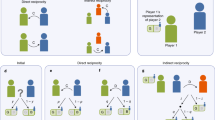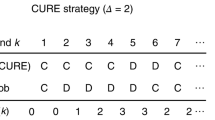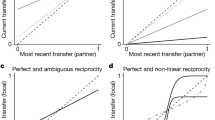Abstract
Darwinian evolution has to provide an explanation for cooperative behaviour. Theories of cooperation are based on kin selection (dependent on genetic relatedness)1,2, group selection3,4,5 and reciprocal altruism6,7,8. The idea of reciprocal altruism usually involves direct reciprocity: repeated encounters between the same individuals allow for the return of an altruistic act by the recipient10,11,12,13,14,15,16. Here we present a new theoretical framework, which is based on indirect reciprocity17 and does not require the same two individuals ever to meet again. Individual selection can nevertheless favour cooperative strategies directed towards recipients that have helped others in the past. Cooperation pays because it confers the image of a valuable community member to the cooperating individual. We present computer simulations and analytic models that specify the conditions required for evolutionary stability18 of indirect reciprocity. We show that the probability of knowing the ‘image’ of the recipient must exceed the cost-to-benefit ratio of the altruistic act. We propose that the emergence of indirect reciprocity was a decisive step for the evolution of human societies.
This is a preview of subscription content, access via your institution
Access options
Subscribe to this journal
Receive 51 print issues and online access
$199.00 per year
only $3.90 per issue
Buy this article
- Purchase on Springer Link
- Instant access to full article PDF
Prices may be subject to local taxes which are calculated during checkout




Similar content being viewed by others
References
Hamilton, W. D. The evolution of altruistic behaviour. Am. Nat. 97, 354–356 (1963).
Hamilton, W. D. The genetical evolution of social behaviour. J. Theor. Biol. 7, 1–16 (1964).
Williams, G. C. Group Selection (Aldine–Atherton, Chicago, (1971).
Eshel, I. On the neighbourhood effect and evolution of altruistic traits. Theor. Popul. Biol. 3, 258–277 (1972).
Wilson, D. S. & Sober, E. Reintroducing group selection to the human behavioural sciences. Behav. Brain Sci. 17, 585–654 (1994).
Trivers, R. The evolution of reciprocal altruism. Q. Rev. Biol. 46, 35–57 (1971).
Axelrod, R. & Hamilton, W. D. The evolution of cooperation. Science 211, 1390 (1981).
Axelrod, R. The Evolution of Cooperation (Basic Books, New York, (1984).
Nowak, M. A. & May, R. M. Evolutionary games and spatial chaos. Nature 359, 826–829 (1992).
Michod, R. E. & Sanderson, M. J. in Evolution: Essays in Honor of John Maynard Smith (eds Greenwood, P. J., Harvey, P. & Slatkin, M.) 95–106 (Cambridge Univ. Press, Cambridge, (1985).
Peck, J. & Feldman, M. The evolution of helping in large, randomly mixed populations. Am. Nat. 127, 209–221 (1985).
Milinski, M. Tit for tat in sticklebacks and the evolution of cooperation. Nature 325, 433–435 (1987).
May, R. M. More evolution of cooperation. Nature 327, 15–17 (1987).
Dugatkin, L. A. Mesterton-Gibbons, M. & Houston, A. I. Beyond the prisoner's dilemma: towards models to discriminate among mechanism of cooperation in nature. Trends Ecol. Evol. 7, 202–205 (1992).
Nowak, M. A. & Sigmund, K. Tit for tat in heterogeneous populations. Nature 355, 250–253 (1992).
Nowak, M. A. & Sigmund, K. Win–stay, lose–shift outperforms tit for tat. Nature 364, 56–58 (1993).
Alexander, R. D. The Biology of Moral Systems (Aldine de Gruyter, New York, (1987).
Maynard Smith, J. Evolution and the Theory of Games (Cambridge Univ. Press, Cambridge, (1982).
Wilson, E. O. Sociobiology (Harvard Univ. Press, Cambridge, MA, (1975).
Krebs, J. R. & Davies, N. B. An Introduction to Behavioural Ecology (Blackwell, Oxford, (1987).
Buss, L. The Evolution of Individuality (Princeton Univ. Press, NJ, (1987).
Frank, S. A. The origin of synergistic symbiosis. J. Theor. Biol. 176, 403–410 (1995).
Binmore, K. G. Fun and Games: a Text on Game Theory (Heath, Lexington, MA, (1992).
Marler, P. & Evans, C. Bird calls: just emotional displays or something more? Ibis 138, 26–33 (1996).
Zahavi, A. & Zahavi, A. The Handicap Principle: A Missing Piece of Darwin's Puzzle (Oxford Univ. Press, Oxford, (1997).
Boyd, R. & Richerson, P. J. The evolution of indirect reciprocity. Social Networks 11, 213–236 (1989).
Sudgen, R. The Economics of Rights, Cooperation and Welfare (Blackwell, Oxford, (1986).
Nowak, M. A. & Sigmund, K. The dynamics of indirect reciprocity. J. Theor. Biol.(submitted).
Pollock, G. B. & Dugatkin, L. A. Reciprocity and the evolution of reputation. J. Theor. Biol. 159, 25–37 (1992).
Hofbauer, J. & Sigmund, K. Evolutionary Games and Population Dynamics (Cambridge Univ. Press, Cambridge, (1998).
Acknowledgements
We thank M. Dawkins, A. Kacelnik, J. Krebs and R. May for discussion. Support from the Wellcome Trust is gratefully acknowledged. Part of this work was done at IIASA (Laxenburg).
Author information
Authors and Affiliations
Corresponding author
Rights and permissions
About this article
Cite this article
Nowak, M., Sigmund, K. Evolution of indirect reciprocity by image scoring. Nature 393, 573–577 (1998). https://doi.org/10.1038/31225
Received:
Accepted:
Issue Date:
DOI: https://doi.org/10.1038/31225
This article is cited by
-
Effect of reciprocity mechanisms on evolutionary dynamics in feedback-evolving games
Nonlinear Dynamics (2024)
-
Group environment promotes the third-party punishment for maintaining social fairness: evidence from ERPs and neural oscillations
Current Psychology (2024)
-
Social dilemma in foraging behavior and evolution of cooperation by learning
Scientific Reports (2023)
-
Subjective consistency increases trust
Scientific Reports (2023)
-
How virtue signalling makes us better: moral preferences with respect to autonomous vehicle type choices
AI & SOCIETY (2023)
Comments
By submitting a comment you agree to abide by our Terms and Community Guidelines. If you find something abusive or that does not comply with our terms or guidelines please flag it as inappropriate.



